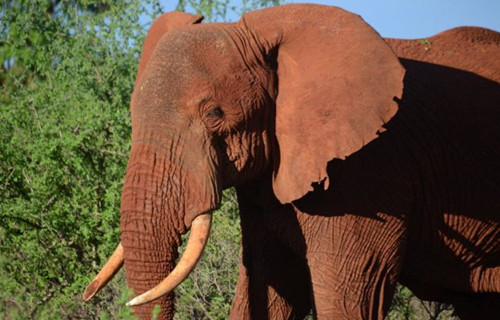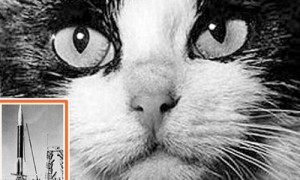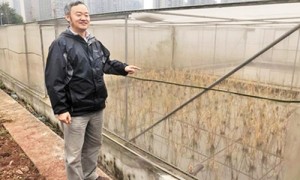世界上最大的象牙市场香港将全面禁止象牙贸易,此举被称为“大象的生命线”。

Hong Kong’s lawmakers have voted overwhelmingly to ban the trade in ivory, in a move campaigners described as "a lifeline for elephants".
香港立法人员以压倒性多数票通过法案,禁止象牙贸易,此举被称为“大象的生命线”。
A similar ban was brought in across mainland China earlier this year.
今年早些时候,中国大陆也出台了类似的禁令。
Ivory sales will be phased out gradually in Hong Kong, stopping completely in 2021.
在香港,象牙贸易将逐步停止,将于2021年全面停止销售。
Prior to the vote, demonstrators gathered outside Hong Kong’s legislature with signs reading: "Do you really need ivory chopsticks?"
投票之前,示威者高举标语“你真的需要象牙筷子吗?”聚集在香港立法机关外。
"Shutting down this massive ivory market has thrown a lifeline to elephants," said Bert Wander of the global advocacy group Avaaz.
“关闭庞大的象牙市场是留给大象的生命线,”全球倡导组织Avaaz的伯特胡姆斯说道。
How big is Hong Kong’s ivory market?
香港的象牙市场有多大?
Ivory from animal tusks - mostly those of elephants - has been traded in Hong Kong for more than 150 years.
象牙(动物长牙)在香港交易150多年了。
It is considered the world’s largest ivory market.
这是世界上最大的象牙市场。
WildAid Hong Kong, a conservation group, says the former British colony had a 670-tonne stockpile in 1989, when the global trade was banned.
保护组织香港野生救援表示,1989年全球贸易被禁时,这个前英国殖民地拥有670吨的库存。
only ivory dating from before that period is meant to be sold there, but campaigners say the legal trade is often a cover for illegal activities.
在此之前,象牙在这里可以出售,但活动人士表示,合法贸易通常是非法活动的幌子。
In July 2017, authorities in Hong Kong said they had seized the world’s biggest ever haul of ivory tusks - some 7.2 tonnes.
2017年7月,香港有关部门表示,他们截获了世界上最大的象牙,重约7.2吨。
More than 90% of those buying ivory in Hong Kong are from the Chinese mainland, which had hitherto been the world’s largest importer of elephant tusks.
超过90%在香港购买象牙的人来自中国大陆,迄今为止中国大陆一直是世界上最大的象牙进口国。
What does a gradual ban mean?
渐进式禁令意味着什么?
The trade in Hong Kong will cease in three stages.
香港象牙贸易将经过三个阶段全面停止。
First, there will be a ban on hunting trophies and ivory from after 1975, when the Convention on International Trade in Endangered Species of Wild Fauna and Flora (CITES) took effect.
首先,从1975年开始,禁止狩猎战利品和象牙,届时《濒危野生动植物种国际贸易公约》(CITES)生效。
Later, ivory obtained before 1975 will also be included. And finally, traders will be obliged to dispose of their stock by 2021.
后来,1975年之前捕获的象牙也涵盖在内。最后,贸易商将不得不在2021年之前处理掉他们的库存。
The penalties for ivory smuggling will also increase considerably.
对象牙走私的处罚力度也将大大加大。
Under the new law, offenders could be fined HK$10m ($1.3m; 1m pound), double the present amount, or imprisoned for 10 years instead of the current two.
根据新法律,违法者将被罚1000万港元(合130万美元或100万英镑),是目前所罚款项的两倍,或者监禁10年而不是目前的两年。
How have campaigners reacted?
活动人士有何反应?
Many conservationists have hailed the ban as a victory.
许多自然资源保护主义者都称赞该禁令是一种胜利。
Alex Hofford of WildAid called it "a great moment in the history of elephant conservation".
野生救援的亚历克斯胡福特称这是“大象保护史上的伟大时刻”。
Hong Kong lawmaker Elizabeth Quat said the vote marked a great day for elephants, but that the changes must be enforced effectively.
香港立法人员伊莉莎白昆特说,这次投票对大象而言是一个伟大的日子,但改变必须得到有效实施。
"It’s now up to our law enforcement agencies to ensure the ban is properly implemented," she said.
她说:“现在要由我们执法机构来确保这项禁令得到合理执行。”
Some activists feel the timeframe is unnecessarily long, however. They point out that African elephants are still being killed for their tusks in huge numbers.
然而,一些活动人士认为,时间框架没有必要太长。他们指出,非洲大象仍然因大量的象牙需求而被猎杀。







